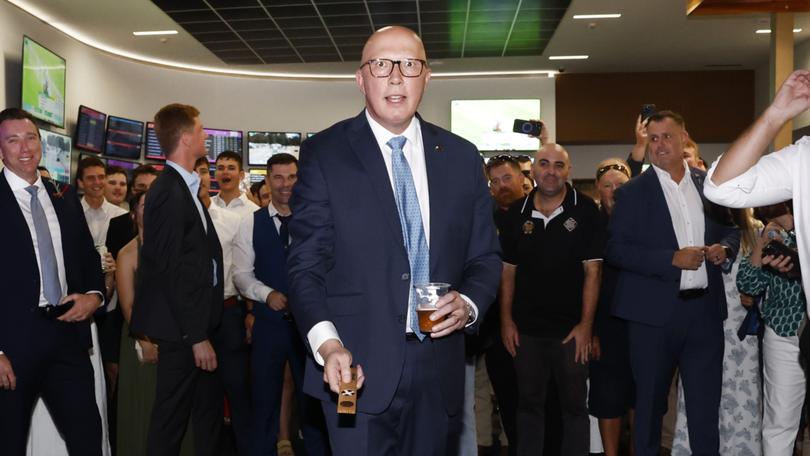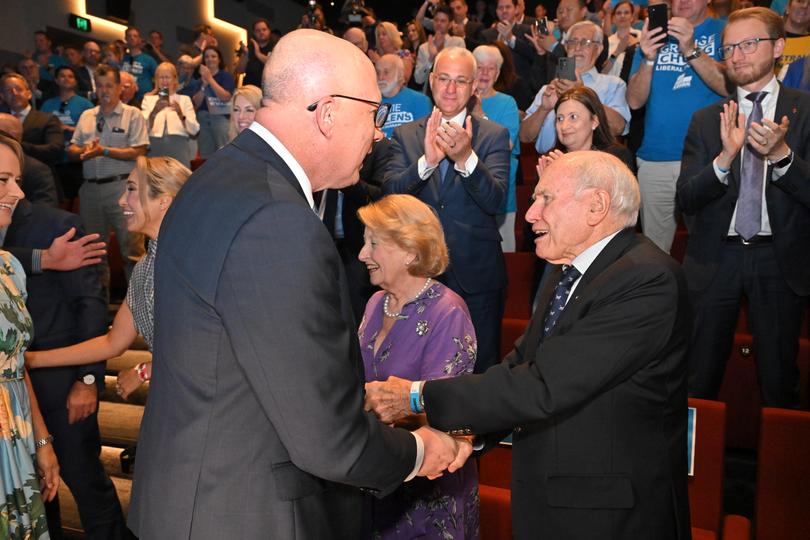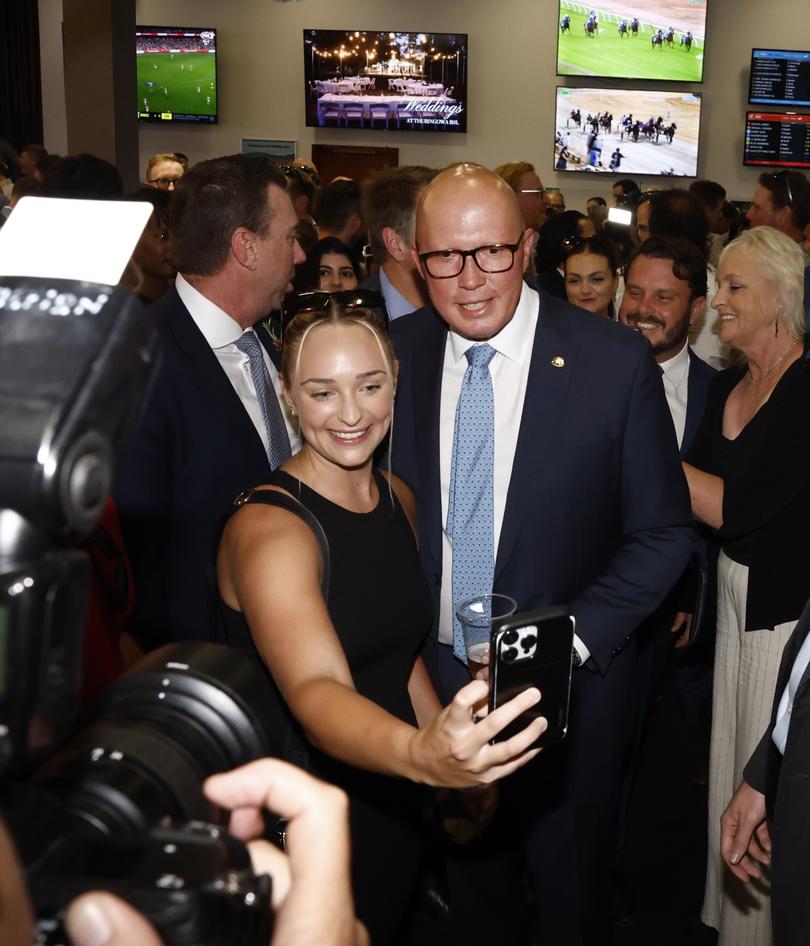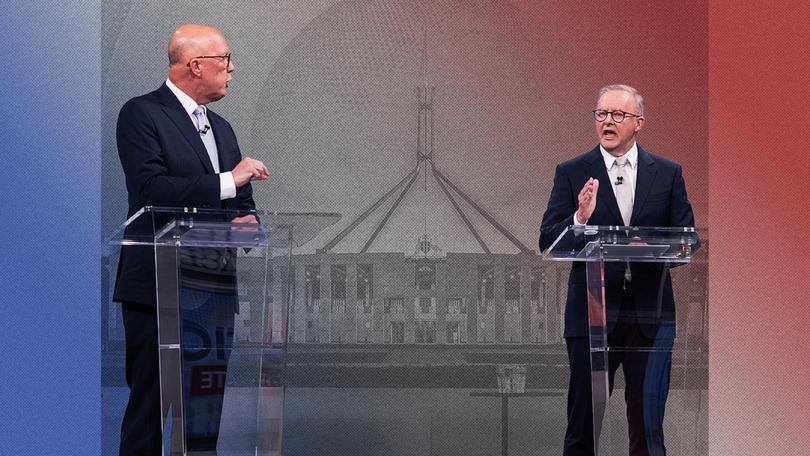LATIKA M BOURKE: With a week to go before the election Dutton finally breaks out of his two-dimensional mould
LATIKA M BOURKE: If every day could be Anzac Day, Peter Dutton might be having a better campaign.

If every day could be Anzac Day, Peter Dutton might be having a better campaign.
Friday was his best moment in the five-week-long battle for government, as he stood in the centre of a boozed-up crowd at the RSL in Townsville in the northern Queensland seat of Herbert, to play two-up.
The crowd booed, whooed and cheered until he eventually flipped a pair. Such was the rowdiness in the venue, one of the ATMs ran out of cash.
Sign up to The Nightly's newsletters.
Get the first look at the digital newspaper, curated daily stories and breaking headlines delivered to your inbox.
By continuing you agree to our Terms and Privacy Policy.Mr Dutton drank a schooner of XXXX and hopped behind the bar to pour himself and others another.
It wasn’t a totally rapturous reception. There were heckles and boos and one woman told The Nightly she thought he was a “piece of s...”.
But overall he was welcomed, especially when it came to the bro vote, with plenty of young men not just keen but downright excited to meet the opposition leader.
Why? “He’s better than Albanese,” said one young bloke in his early twenties, who did not want to be named.
Mr Dutton spent around two hours mingling, listening with concern to veterans, sympathising with a single woman who told him her troubles about trying to find a rental, despite earning a $91k salary.
Smiling and laughing, he made his way through the crowd in the safe LNP seat with an ease that he’s struggled to show elsewhere around the country.
Awkward and stilted, his campaign to date has felt reminiscent of Julia Gillard’s in 2010, although he thankfully hasn’t attempted her disastrous campaign tactic of flipping the switch to light up the “Real Julia.”
The motive for that was understandable, if not desirable – the view was that if Australia’s first woman prime minister could be left to just be herself, people might like her. The saying went that if every person could meet her, they’d vote for her.
There was a truth and logic to the rationale. However, because she knifed Kevin Rudd for the prime ministership, unexpectedly and shockingly, the stunt was widely panned as cynical and the rest is history.
Julia Gillard’s staff would regularly grieve that campaign, the hung result, and the way it formed her public persona versus the person and leader that they knew in private.
On camera, she was wooden and robotic, in person she was warm, likeable and extremely funny.
In many ways, Peter Dutton’s 2025 tilt suffers the same problem.

The great frustration expressed by those around him is how difficult it has been to show the public his most likeable traits.
Unusually for a leader, but like Gillard, Mr Dutton is no showman.
He is deeply unsuited to the circus acts required to qualify as a picture-worthy subject for the nightly news, in the hope the campaign’s broader messages will be carried.
As minister in national security portfolios, with the gravitas and resources that come with being in government acting as a balustrade, this never mattered — a defence minister could afford to be flat, but serious.
But as an Opposition Leader in fight mode, a degree of conviviality is vital to helping voters round out their understanding of any politician wanting to lead the country. The lack of light to counter the shade has been a major drawback.
While Mr Dutton has been forced to indulge in the stunts, turning sausages and filling up petrol bowsers — to promote the 25 cent per litre cut to the fuel excise which is cutting through for the Coalition – staring at signs with funding announcements on them for the cameras, it’s obvious he does not relish what everyone knows are performative, manufactured stunts.
There’s a sense that the performance for the cameras, versus his genuine skill at meeting voters, is all a bit beneath him. Gillard radiated the same disdain for what passes, rightly or wrongly, as modern electioneering.
But Anzac Day was the first time Mr Dutton genuinely looked like he was enjoying the campaign trail.

The lack of energy has been the sharpest difference between the Opposition Leader and the Prime Minister’s campaign. While the Prime Minister has occasionally had his fiancée Jodie by his side, he has mostly relied on a rotating cast of cabinet colleagues to help boost his mood during the relentless days.
Mr Dutton opts for his staff and family when it comes to mental support.
His wife Kirrily, a speech therapist, accompanies him when her workload allows, and his children, Harry, Tom and Bec have been on the road.
That’s despite the fact commentators didn’t treat Harry’s foray into frontline politics as an overly successful exercise given that it resulted in Mr Dutton having to say he’d loan his son the money for his first mortgage.
Ralph, the Duttons’ six-year-old spoodle, who is said to “run the family,” made his debut at an outing on Easter Sunday at a breakfast barbecue with LNP supporters at a park in the Labor-held Queensland seat of Blair.
Family and mental health are important to Mr Dutton, who meditates twice a day and exercises in the early morning when the punishing campaign schedule allows. He trusts his own judgement and instincts first and foremost but when it comes to taking advice, top of his counsel and in his travelling party is his chief of staff Alex Dalgleish. The 40-year-old former lawyer has been with Mr Dutton since the election of the Abbott government in 2013.
Another Abbott-era stalwart in the travelling party is his director of communications, Nicole Chant. One constant between both sides is that their staff all actively abhor the limelight. It is as if they both follow the directive of Donald Trump’s chief of staff Susie Wiles who said on her first day in the White House that there would be zero tolerance for star staff trying to outshine their bosses.
But a crucial difference between Mr Dutton’s campaign infrastructure to the Prime Minister’s is the lack of a parliamentary elder or colleague amongst his team. Some of the frontbenchers Mr Dutton is closest to – such as Shadow Treasurer Angus Taylor, Nationals Leader David Littleproud, Campaign spokesman James Paterson, Victorian Michael Sukkar and Queensland Senator James McGrath — have made appearances but are not permanent fixtures.
Perhaps the most likely candidate might have been one of his closest political friends, the former MP Jamie Briggs, but he is in campaign headquarters in Parramatta in Western Sydney, serving as the link between Mr Dutton and the Liberals’ federal director Andrew Hirst.
The other big difference is the near total distance the Opposition Leader maintains with his travelling media compared to the Prime Minister and his team.
For example, the Prime Minister held drinks for his media cohort at The Lodge on the first night of the campaign. Then, on the eve of the Labor party’s campaign launch in Perth, journalists were invited to a local bar to mingle with half a dozen cabinet ministers, the party’s national secretary Paul Erickson, the Prime Minister’s chief of staff Tim Gartrell, director of communications Fiona Sugden as well as the ALP policy chief and wider media team.
Mr Dutton prefers to deal with the media only when he has to – meaning the encounters are on camera and when he is holding a combative press conference, when he is most guarded and tense.
All up, it constricts and confines him to being a mostly 2D figure.
It goes some way to explaining how so little is known about someone who has been a public figure for almost as long as the Prime Minister.
Even today, Mr Dutton’s public persona remains flat and largely centres around him being a right-wing warrior.
This is why his flirtation with Trumpian tactics, like an Australian-style DOGE and slashing the Canberra public service by almost half, burned him so ferociously.
If the Opposition Leader likes sports, the public barely knows it. While he has given interviews talking about practising meditation and his love for organic farming on their property outside Brisbane, like the Coalition’s policy offerings, it has all been far too little and possibly too late.
But why this is the case is the most mystifying part because there is enough work with. In person, Mr Dutton is jovial, quick to laugh, has a teasing humour, enjoys being ribbed back and is wholly non-pretentious.
Shortly after he lost pre-selection against now-retired former cabinet minister Karen Andrews for the Gold Coast seat of Macpherson 15 years ago, he was dining out with some Liberal friends in Canberra. When someone joked that he couldn’t be trusted to calculate the bill because he couldn’t even do his own numbers, he was the first to burst out laughing.
Unlike the majority of Parliament’s glass-jawed inhabitants, Mr Dutton does self-deprecation and it’s genuine.
And he also does resilience. Even though he was hunting for a safer seat in 2009, he’s managed to hold on to Dickson, currently the LNP’s most marginal Queensland seat, since he first won it in 2001.
Prime Minister Anthony Albanese paid tribute to this tenacity at the end of Tuesday’s leaders’ debate, when he was asked by Nine host Ally Langdon to list three things he liked about the Opposition Leader.
“Longevity in politics,” Mr Albanese said.
“We’ve been in Parliament for basically the same amount of time, almost, both been there for more than 20 years.

“That’s an achievement and Peter, in that time as well, has had a tough seat that he’s contested consistently over a long period of time.”
The campaign has offered only a few rare glimpses into the secret of Mr Dutton’s political endurance.
Easter Saturday was one. During a one-hour walk through the Sydney Royal Easter Show numerous voters approached him to wish him well and ask for selfies. He was quick to ask parents about their children, their ages and sporting interests and so on.
Streetwalks are one of the riskiest - but most indicative - forms of campaigning. The risks, setting aside the obvious security concerns, are numerous: advisers cannot control or predict who will meet the leader, what they will say and how the interaction, all played out on camera, will go. A single heckle can derail the whole day, even set the mood for the rest of the campaign.
The Prime Minister, whose not entirely flawless campaign has included denials that he fell off a stage despite obvious footage showing this happening, has been far more risk-averse in his election stunts for this reason. On one of the few opportunities he was put in the position of meeting an unvetted constituent, it turned out to be a left-leaning voter who put him in a tricky spot when he urged the Prime Minister to save Australia from a “Temu Trump,” in Mr Dutton.
Of those who asked to meet Mr Dutton and were approached by The Nightly, all identified as Liberal voters. But this in itself was still indicative.
If the base is dismayed by Mr Dutton’s dismount in the polls, this wasn’t apparent amongst the Coalition supporters he met. And for someone who his Labor opponent in Dickson Ali France would have the public believe is a ”monster”, this was miles away from the reaction those at the Easter Show gave him.
If he had opponents they did the Australian thing and kept their polite distance. Just one man shouted a protest, calling the opposition leader a “knob,” but was far enough away that he couldn’t be heard.
Overall it is these encounters that buoys the Liberals. Those with access to the track poll say their research shows the party is in a better position than the national polls suggest and remain competitive in target seats.
They say the soft vote is enormous and higher than past elections, despite about 2.3 million voters or 14 per cent already casting their votes since pre-polling opened on Tuesday.
But only a handful pretend the Coalition is still aiming for a majority government. This was always a near-impossible goal given that Australians have re-endorsed first-term governments for nearly the last 100 years.
The public polling shows Labor is on track to retain government, possibly in minority, although majority is no longer out of the question, given the stunning turnaround Anthony Albanese has staged in raising Labor’s stubbornly low primary by one point.
How on earth Mr Dutton lost his lead to a Prime Minister he calls the worst since Whitlam, will be the subject of the election post-mortems.
One obvious failure has been the inability of Mr Dutton and his team to find a way to reframe himself. The hardman image that Mr Dutton embraced as a tough-talking, leftie-baiting, Immigration, Home Affairs and Defence Minister meant this task was vital and should have been done almost as soon as he became leader.
The Coalition has long argued it had plenty of time to regroup. With the final week of campaigning approaching, its time is up and Peter Dutton needs to maintain that Anzac Day mojo all the way to the ballot box next Saturday.
